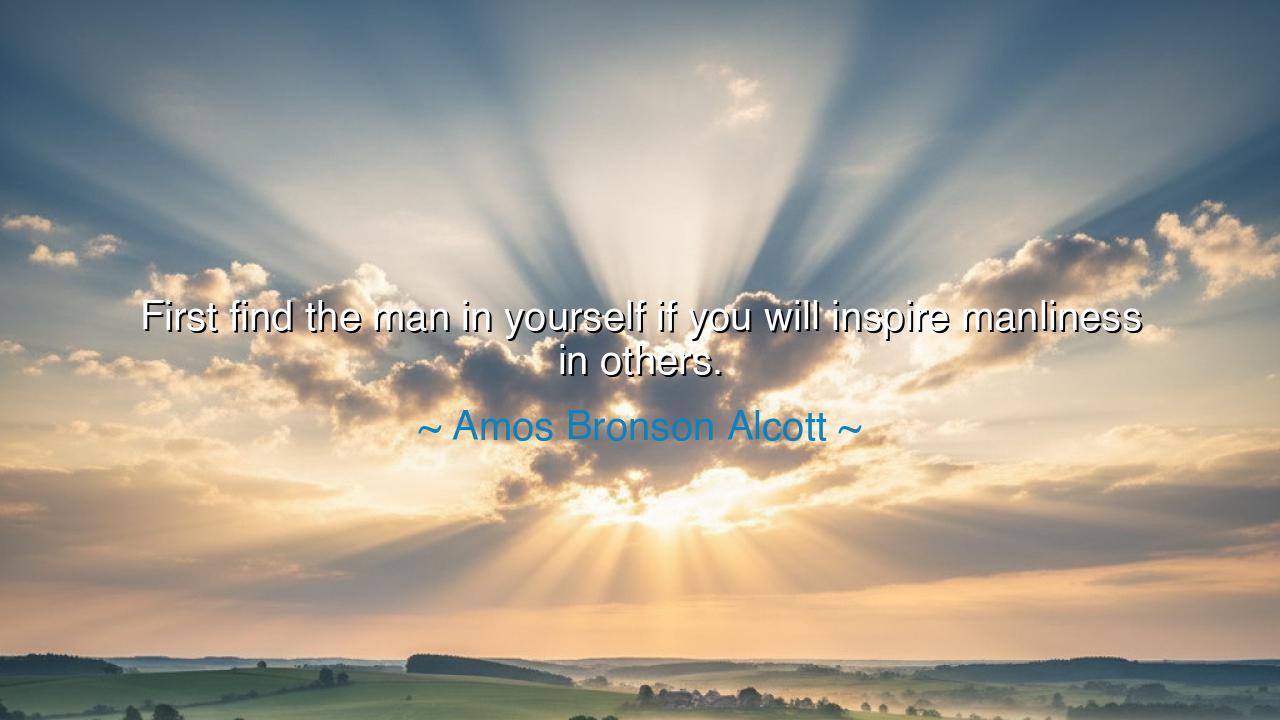
First find the man in yourself if you will inspire manliness in






The words of Amos Bronson Alcott, “First find the man in yourself if you will inspire manliness in others,” resound with the timeless call of integrity. They are not merely an exhortation to men, but a command to every soul who would lead, teach, or elevate another. In these few words, Alcott—philosopher, teacher, and father of Louisa May Alcott—summons us to a higher discipline: to look inward before we look outward, to cultivate in ourselves the virtues we would awaken in the world. For he knew, as the ancients did, that example is the truest form of instruction, and that no voice can move the hearts of others if it does not first rise from a life of truth.
In his time, Alcott belonged to the Transcendentalist movement, that noble gathering of thinkers—Emerson, Thoreau, and Fuller among them—who sought to lift the human spirit above conformity and fear. To him, “manliness” was not brute strength nor dominance, but the full stature of moral being: courage joined with compassion, strength balanced by self-mastery. When he says “find the man in yourself,” he means to awaken the divine capacity within—the reason, conscience, and integrity that make one truly human. To “inspire manliness in others” is not to command them, but to reflect such light from within oneself that others are drawn naturally to the flame.
This teaching mirrors the wisdom of the ancients. The philosopher Socrates taught that the unexamined life is unworthy of the man who would lead others. Before he questioned the world, he questioned himself. Likewise, Confucius, in the East, declared that the noble man first cultivates his own virtue, then his family, then the state, and finally, peace under heaven. From Athens to China, the pattern is the same: leadership without inner mastery is hollow; reform without self-discipline is hypocrisy. Alcott, standing in this lineage of wisdom, reminds us that true influence begins not with speech, but with character.
Consider the life of George Washington, who, before he became the father of a nation, first became master of his own soul. History tells us he was not born a saint—his temper was fierce, his pride quick to rise. Yet through conscious effort, he tamed his passions and governed himself with quiet dignity. When he led men into war, they followed not because he demanded obedience, but because he embodied steadiness and restraint. In him, the “man” had been found before the leader was revealed. His greatness flowed not from command, but from example—the very truth Alcott proclaims.
There is a deeper current within this quote, too: the call to authenticity. In an age—like Alcott’s, and like ours—when many preach virtue but live otherwise, he reminds us that moral power cannot be borrowed. A man cannot speak of courage if he himself quails before fear; he cannot call others to honesty while he hides behind deceit. To “find the man in yourself” is to face the shadows of your own heart—to confront your weaknesses, your vanity, your pretenses—and to refine them into sincerity. Only then does your influence become living and pure, for men trust not words, but presence. The spirit that has mastered itself is magnetic; the one that has not is empty noise.
Alcott’s words also carry a warning against false mentorship. Many wish to shape others before shaping themselves—to command before understanding, to teach before learning. But the wise know that leadership is not performance; it is transmission. The energy of one soul passes into another only when it is real. A father cannot raise noble children unless he himself is striving toward nobility. A teacher cannot awaken curiosity if his own heart has grown cold. A leader cannot summon courage in his followers unless he himself has faced danger without flinching. Influence begins in the depths of one’s own being, and radiates outward like light through crystal.
So let this teaching be passed down: do not seek to mold others before you have molded yourself. Let your words be born of experience, your ideals tested by discipline, your compassion deepened by struggle. For the man who has found himself needs no title, no reward, no acclaim—his very being inspires others to rise. He is a living standard, a quiet force, a soul that calls others home to themselves. As Amos Bronson Alcott teaches, before you would awaken greatness in another, become great in the secret chambers of your own heart. Only then will your influence endure—not as command, but as light, shining through the generations.






AAdministratorAdministrator
Welcome, honored guests. Please leave a comment, we will respond soon